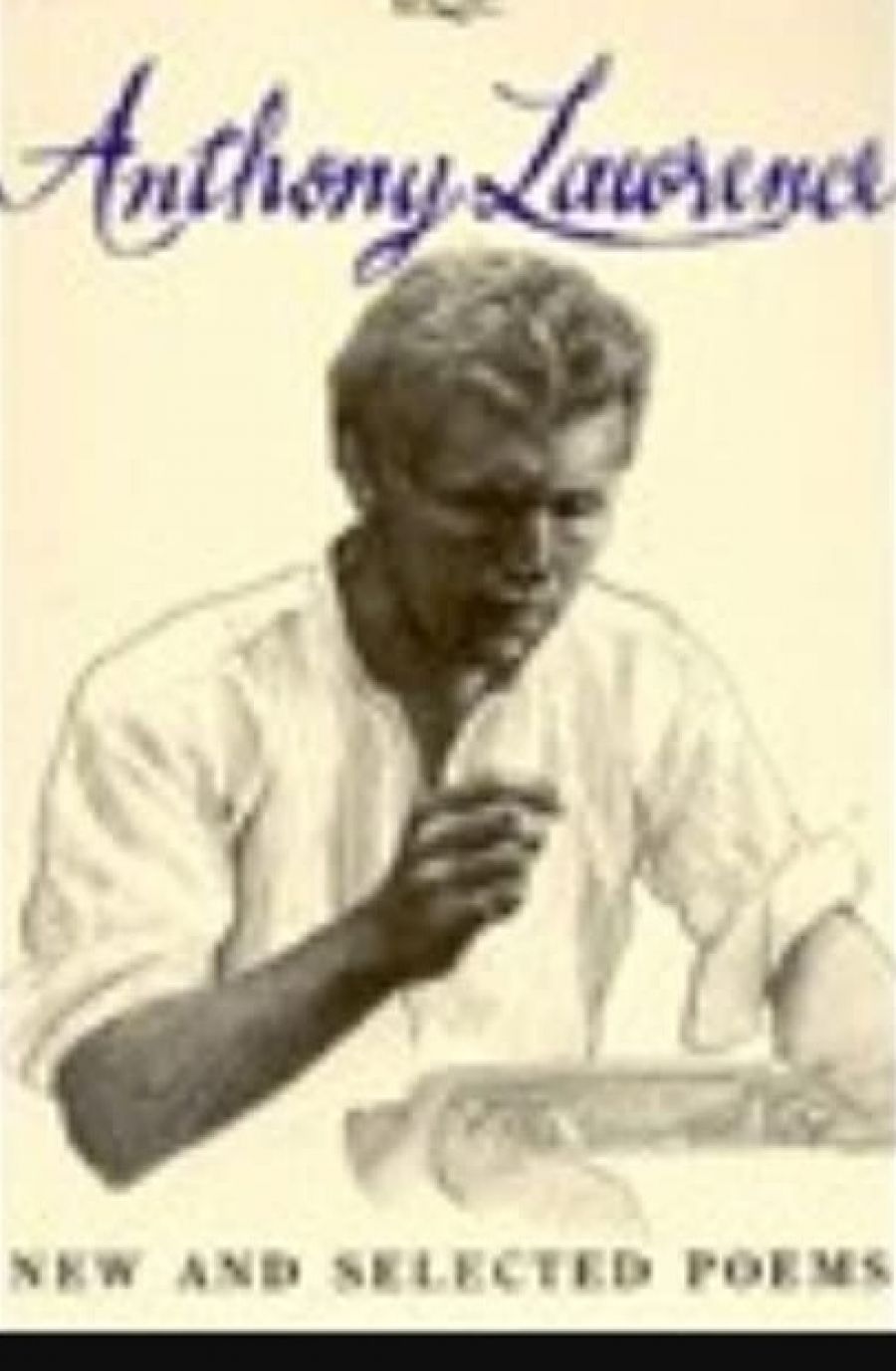
- Free Article: No
- Contents Category: Poetry
- Review Article: Yes
- Online Only: No
- Custom Highlight Text:
If presence in literary journals, anthologies and at writers’ festivals may be taken as an indication of a poet’s importance, Anthony Lawrence has for some time been regarded as one of Australia’s foremost poets of the post-’68 generation. He has published five books of poetry, all of which to my knowledge have been well received, and he has also been the recipient of many prizes, most recently the inaugural Gwen Harwood Memorial Prize and one of the Newcastle Poetry Prizes for 1997. With the publication of his New and Selected, Lawrence seems to have been canonised.
- Book 1 Title: New and Selected Poems
- Book 1 Biblio: University of Queensland Press, $24.95 pb, 335 pp
What a reader thinks of Lawrence’s work depends largely on what he or she thinks of Romanticism. Lawrence, perhaps even more than his predecessor in this regard, Robert Adamson, relies on the role of a Romantic protagonist to allow him to articulate the experience of a suffering self. Of course, not all Lawrence’s work is concerned with suffering or even with the self – there is a wide range of poetry in this volume – yet underlying his entire body of work is the notion of the individual in turmoil.
In his early poems, ‘The Art of Killing’ and ‘Cro-Kill’, the turmoil is that of confusion, of an absence of values. This is true of his later poems as well, except that they tend to be more overtly affected by the personal. To me it seems that Lawrence’s reliance on a Romantic ‘I’ and its concomitant lyrical and occasionally absurd utterances – for example ‘I would have said: “Let us praise /the luminous scar on the perineum. / / Let us curse the indignity of revival, and summon/ strategies for confronting the names of our fear!”’ (‘Strategies for Confronting Fear’) is a result of his attempt to develop a realm in Australian poetry in which an individual’s anxiety and fear may be publicly stated. This is a necessary and admirable project but one that, in my opinion, is not achievable solely through the use of the Romantic ‘I’.
The problem readers may have with Lawrence’s adoption of the Romantic notion of the poet as hero, as seer or as damaged male is the difficulty I have with certain of the poems and with parts of many poems. The problem is the question of the degree to which the Imagination is literally true. When the poet writes, in the voice of a Satin Bower Bird, ‘I am the translator of many languages’ (from ‘Bird Calls’), are we supposed to be satisfied with the literary conceit despite knowing that in certain poetries the shaman-poet would actually be the bird? Or when the poet, writing in ‘Bulbs’, compares the poem he has been working on to the germination of bulbs, are we supposed to literally accept that the poem is an organic – as opposed to a fabricated – phenomenon?
This is important to keep in mind when reading Lawrence because he presents us with choices regarding our judgment of his protagonists’ actions within the poems. Sometimes their suffering is apparently trivial, they are merely sick of dysentery (as in ‘Incident at Heraklion’) or of insomnia (in ‘The Grim Periphery’) or, as in many poems, just of drunkenness, and Lawrence seems to intend us to understand their experience as evidence of an insightful state, a meditation in a general sense.
At other times the action is obviously a gesture intended to be greatly meaningful though it only demonstrates the failure of Romantic rhetoric in a (post)modern Australia:
Half-pissed by the time
I roar into Fremantle, a few surfers paddling in dusklight,
the poetry of a long drive on the make,
the engine killed, and the last bottle drained off like communion in a carpark
overlooking the sea. (‘A Most Troublesome Possession’)
The problem of role can be solved by writing in persona. I was surprised to find that these poems in another’s voice were very striking, particularly the sequence ‘Blood Oath’, a tragic story of two jackaroos who attempt to escape their sadistic boss, a poem which can be regarded as one of Lawrence’s most successful works. Similarly successful is ‘Ratbag Monologues’, a sequence in the voices of Sydney eccentrics.
The apparently autobiographical poems, in comparison with these persona poems, are burdened with a marked interplay between significance and insignificance – the reader’s difficulty in discerning the important from the unimportant – and a language that can tend to overplay the reality it describes.
Lawrence’s shorter, subdued lyric poems, while not being the mainstream of his work, are of the most interest to me because they achieve what I enjoy and what Lawrence seems to be aiming for – a focus on sensuality, mortality and suffering in everyday life. Of these poems, ‘Hania’, ‘Retirement’ and ‘Watching Dennis Potter Drink’ remain with me.
Overall, despite the acclaim Lawrence has received, I feel that his work is yet to find a middle ground between the inflated rhetoric of an inherited Romanticism and the well-crafted, carefully observed details out of which he always composes his poems. His latest collection, published for the first time as the last section of this book (‘Skinned by Light’) indicates something of Lawrence’s awareness of this dilemma. In the poem, ‘Thanatos’, the protagonist, looking down a precipice, ‘swallowing thoughts of death’, asks himself
Does imagination die before
the body? The prayer or scream
you let fly on the way down
will be silenced
by the head’s incomprehension.
Before you turn away, say your name
and count the seconds it takes
for the name to be repeated
from rockface or the face
of someone else who has come
to stand between the need
to live and the need to fall.


Comments powered by CComment